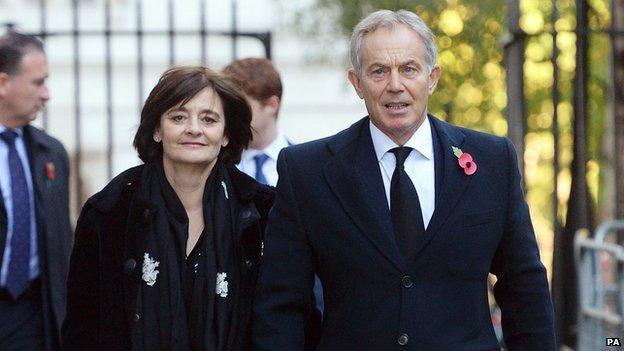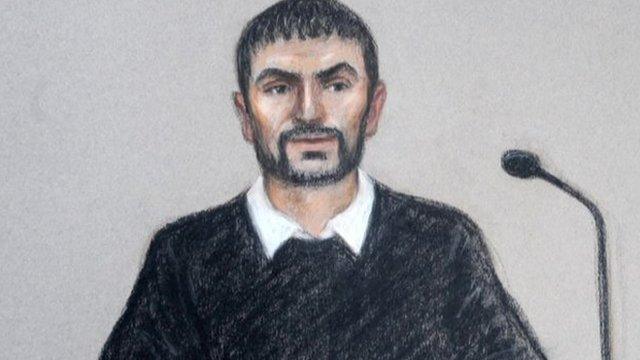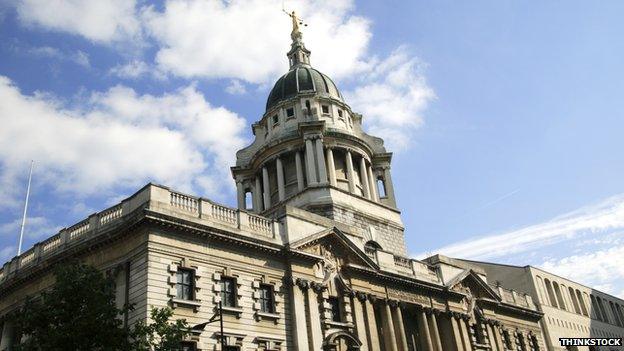Erol Incedal: Student cleared of planning terror attack
- Published
Most evidence in the case was heard in secret, as June Kelly reports
Law student Erol Incedal has been cleared at the Old Bailey of planning a terrorist attack.
Turkish-born Incedal, 27, from London, was found not guilty after the jury deliberated for a total of 27 hours.
The court was adjourned briefly to allow the defendant to regain his composure, after he began weeping as he thanked the jurors.
Most of the trial had been held in secret, and the details of the accusation can still not be reported.
During the public sessions the trial heard how Incedal travelled to Syria, where he met a fighter known as Ahmed.
The pair discussed, via email, doing terrorist attacks in the summer of 2013, jurors were told.
Listening device
Prosecutor Richard Whittam QC said the men were talking about the murder of an individual of significance, such as former prime minister Tony Blair, and an attack such as that in Mumbai, where automatic rifles were used and a number of people killed.
The attack in the Indian city, in November 2008, left 164 people dead.
The prosecution said Incedal's plans were scuppered by police who bugged his car after he was stopped for speeding in September 2013.
During a search of Incedal's car while he was in custody, officers found a slip of paper inside a glasses case which had the address of a property belonging to Mr Blair and his wife, Cherie.
Incedal was released and the listening device recorded him talking about buying a gun and his time in war-torn Syria.
After two weeks, armed police stopped him and his friend, Mounir Rarmoul-Bouhadjar, as they were driving near Tower Bridge in central London.
Inside Incedal's phone case was a memory card and on it were instructions on how to assemble a bomb.
He was convicted of possessing this bomb-making guide last year.
Incedal will be sentenced on Wednesday with Rarmoul-Bouhadjar, also 27, who admitted having an identical manual.

Police discovered a piece of paper in Erol Incedal's car with the address of Tony and Cherie Blair on it
During a search of Incedal's family home in Unity Court, south east London, officers found notes for "Plan A" that referred to two "tennis racquets", which the court heard was code for guns.
The defendant said "Plan A" was a sketch of ideas for an armed robbery on a jewellers, which he had been thinking about proposing to three sons of the radical cleric Abu Hamza.
During the search of another address, in Sussex Gardens, near Paddington, police found Skype messages and emails on a laptop that included references to guns, the court heard.
Incedal, a married father-of-two, denied that he had been planning a terror attack with others.
He said that he had been living off student loans and was struggling to provide for his family at the time, so had been considering schemes to make money.
Secret trial
The judge told the jury there had been unusual arrangements regarding public attendance and reporting of the trial. These will be reviewed on Friday.
BBC home affairs correspondent June Kelly said the case had unprecedented levels of secrecy and much of the evidence was heard behind closed doors.
The decision to hold so much of trial in secret is likely to come under scrutiny, since the jury decided that the evidence it had heard did not prove the case against Ercol Incedal beyond reasonable doubt.
The Times's crime and security editor, Sean O'Neill, was one of the few journalists who was permitted to hear some of the court sessions, and expressed grave reservations about the enforced secrecy.
He said: "There is a lot that we have heard in court that should not have been secret and should be aired in public and scrutinised.
"The key facts are there and I'm itching to write them."
- Published26 March 2015

- Published26 March 2015

- Published26 March 2015